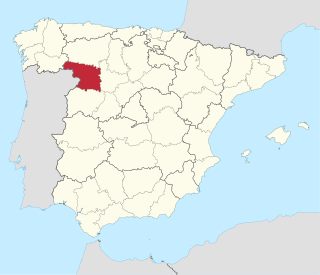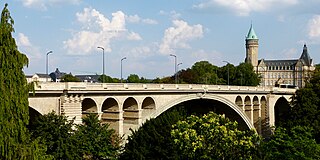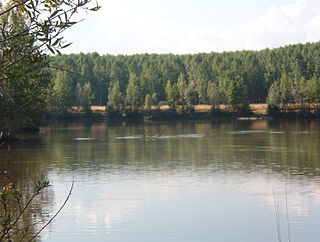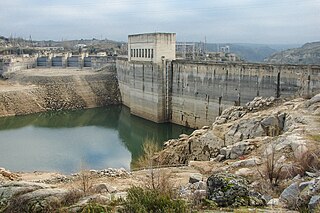
The Douro is the largest river of the Iberian Peninsula by discharge. It rises near Duruelo de la Sierra in the Spanish province of Soria, meanders briefly south, then flows generally west through the northern part of the Meseta Central in Castile and León into northern Portugal. Its largest tributary is the right-bank Esla. The Douro flows into the Atlantic Ocean at Porto, the second largest city of Portugal.

Salamanca is a province of western Spain, in the western part of the autonomous community of Castile and León. It is bordered by the provinces of Zamora, Valladolid, Ávila, and Cáceres, and on the west by Portugal. It has an area of 12,349 km2 and in 2018 had a population of 331,473 people. It is divided into 362 municipalities, 11 comarcas, 32 mancomunidades and five judicial districts. Of the 362 municipalities, more than half are villages with fewer than 300 people.

Zamora is a province of western Spain, in the western part of the autonomous community of Castile and León. It is bordered by the provinces of Ourense, León, Valladolid, and Salamanca, and by Portugal.

The Adolphe Bridge is a double-decked arch bridge in Luxembourg City, in southern Luxembourg. The bridge provides a one-way route for road traffic across the Pétrusse, from Boulevard Royal, in Ville Haute, to Avenue de la Liberté, on the Bourbon Plateau in Gare. Its upper deck is 153 m in length and carries two lanes of road traffic, and two pedestrian footpaths. Its lower deck, opened in 2018, suspended beneath the upper deck, is 154 m in length, and carries a dedicated bidirectional bicycle path, with access provided for pedestrian use. As of 13 December 2020, following the completion of the second phase of the construction of the city's new tramline, the bridge carries bidirectional tram traffic on its upper deck.

San Pedro de la Nave is an Early Medieval church in the province of Zamora, Spain. It is in the locality of El Campillo in the municipal unit of San Pedro de la Nave-Almendra. It was moved from its original site near the River Esla when the land was to be flooded by the construction of the Ricobayo reservoir.

The Autovía A-66 is a major highway in western Spain, part of the European route E803. The road is an upgrade of the N-630 which was undertaken section by section. The route roughly corresponds to the ancient Roman 'Silver Route' connecting the cities of Mérida and Astorga.

The A-52 is a highway in northwestern Spain. It starts at Vigo heads east from the town crossing the Autopista AP-9 and then the N-550/Autovía A-55. It then goes over the Rio Tea running parallel to the N-120 and along the Rio Miño. At Ourense the road turns south out of the valley in conjunction with the N-525. It passes over the Alto de Allariz (725m) and Alto de Estivadas (900m). At Verín the N-532 heads 13 km south to the Portugal frontier where it becomes the E-801/A-24/IP-3.

The Alconétar Bridge, also known as Puente de Mantible, was a Roman segmental arch bridge in the Extremadura region, Spain. The ancient structure, which featured flattened arches with a span-to-rise ratio of 4–5:1, is one of the earliest of its kind. Due to its design, it is assumed that the bridge was erected in the early 2nd century AD by the emperors Trajan or Hadrian, possibly under the guidance of Apollodorus of Damascus, the most famous architect of the time.

The Almendra Dam, also known as Villarino Dam, in Salamanca, Spain, interrupts the course of the River Tormes five kilometres from the village from which it takes its name: Almendra. It was constructed between 1963 and 1970.

The Esla is a river in the provinces of León and Zamora in the northwest of Spain. It is a tributary of the Duero River that starts in the Cantabrian Mountains and is 275 kilometres (171 mi) long. Its direction of flow is from north to south. It is the largest tributary of the Duero in terms of discharge; in fact, at its mouth at the confluence with the Duero, it has a greater discharge than the volume in the main river.
El Castillón is an archaeological site located in the Spanish hamlet of Santa Eulalia de Tábara, in the municipality of Moreruela de Tábara, province of Zamora, region of Castile and León on the Spanish mainland.

Ricobayo is a locality in the province of Zamora, Spain. Formerly a municipality in its own right, it is part of Muelas del Pan.

The Ricobayo Dam is a hydroelectric engineering work built on the lower course of the Esla river. It is located less than 1 km from Ricobayo de Alba, in the province of Zamora, Castilla y León, Spain.













